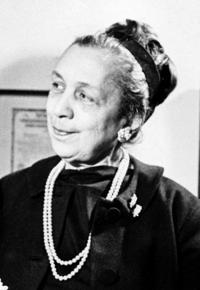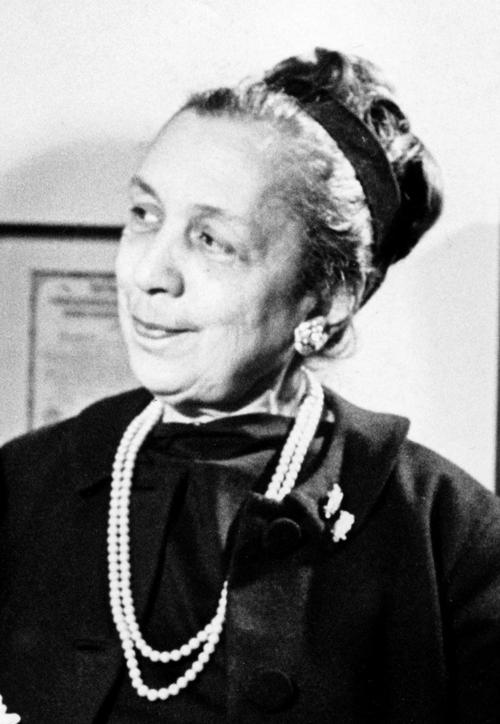By the time Ethel Maynard arrived in Tucson in 1946, she was already an experienced nurse, having worked more than 20 years in New York hospitals, most of that time in the public health field.
Ethel, 41 and a divorced mother of one, embraced her new community with a vigor that had seen her through some very hard times. The color of her skin made little difference in the bustling Big Apple, but 1940s Tucson, with a population of less than 40,000, had yet to realize an influx of black families. That, however, was not about to stop Ethel from making a mark in her new hometown.
Born in Waterbury, Connecticut, on Nov. 23, 1905, both of Ethel’s parents were teachers before her father went into the ministry.
Ethel was working in Harlem by the time she was in her 20s. She married Dr. Aubre de Lambert Maynard on Aug. 15, 1928. They had one daughter. After discovering her husband with another woman, Ethel divorced him in 1930.
Dr. Maynard was the first black physician to be hired at Harlem Hospital. In 1958, he was lauded for saving the life of the Rev. Martin Luther King Jr. after King was stabbed during a New York book-signing.
After the divorce, Ethel may have taken in boarders at her New York City home as the 1940 U.S. Census lists her 10-year-old daughter, Ninon Barbara Maynard, living with her along with three other individuals recorded as tenants.
Arriving in Tucson in 1946, Ethel went to work at Tucson Medical Center and later as a nurse for Tucson District One, a job she held for more than 20 years.
She immersed herself in politics, becoming active in the Democratic Party and serving as a precinct committeewoman. In 1956, she headed to Chicago as an Arizona delegate to the Democratic National Convention.
The following year, Ethel was named one of 12 appointees to the advisory board of the City Democratic Central Committee. According to City Chairman W. Evans Bagley, “All of these persons have been active workers for many years in the interests of the Democratic Party in Tucson, and Pima County.”
In 1958, she was the only Tucson woman to attend the Democratic Women Leaders Conference in Washington, D.C. She ran for a seat on the Tucson City Council in 1963 but was defeated. Ethel, however, did not know the meaning of defeat.
“Nurse Enters Contest for State House Post,” proclaimed the July 2, 1966, headline in the Arizona Daily Star when Ethel ran for a seat in the Arizona House of Representatives. Her credentials made her a formidable candidate. She was already serving as a member of the National Association for the Advancement of Colored People and on the Tucson Commission on Human Relations. She was vice president of the Tucson Council for Civic Unity, active on the Tucson Planned Parenthood Council and founder of the Safford Area Council of the Tucson Committee for Economic Opportunity. She had also served as a member of the Tucson League of Women Voters and the American Indian Affairs Committee.
The primary race was close, with Ethel winning by 45 votes. She now had to face Republican Morgan Maxwell Jr., a real estate appraiser, creating what one newspaper called “an unprecedented situation” since both candidates were black.
Handily winning, Ethel became the first black woman to hold a seat in the Arizona Legislature. She almost immediately had her hands full.
Speaking about racial unrest at the 1967 regional convention of the National Association of Colored Women’s Clubs, she argued, “Some of my people feel that white people have offered only token words and that they therefore must take to the streets. Well, I think they’ve made their point. It’s time to stop now before more innocent people are killed. You can build nothing on hate. Civil rights and civil riots are not the same. Now you will have to take a stand. Instead of ‘Burn, Baby, Burn,’ we should be saying, ‘Build, Baby, Build,’ or ‘Learn, Baby, Learn.’”
Seeking re-election in 1968, Ethel had proved herself in the Legislature by serving on the House Public Health and Welfare Committee. She was again elected to serve the people of Tucson.
A movement to correct history books to reflect a more accurate portrayal of black history prompted Ethel to urge the production of “a history that has been submerged.” Speaking to a group of students at Flowing Wells High School in 1969, she said that after “telling about the suffering and humiliation of the slaves, a girl asked, ‘If they were mistreated why didn’t they go to court? Why didn’t they go someplace else? Why did they stay and take it?’ Ethel had to explain, “They had no outs. They had no place to go.”
Her third session in the House became her most challenging and productive. Working beside her colleague Etta Mae “Ma Hutch” Hutchinson, who had been in the Legislature since 1953, the twosome launched a campaign to develop state-financed kindergarten. They supported the right of 18-year-olds to vote and wanted auto-emission inspections.
Ethel retired from her nursing position in 1971, but was not yet through with politics. However, ill health prevented her from running a vigorous contest for a fourth term. She lost in the primary.
Ethel Maynard died May 20, 1980, after a lifetime of serving as a staunch advocate for civil rights as well as human rights.





